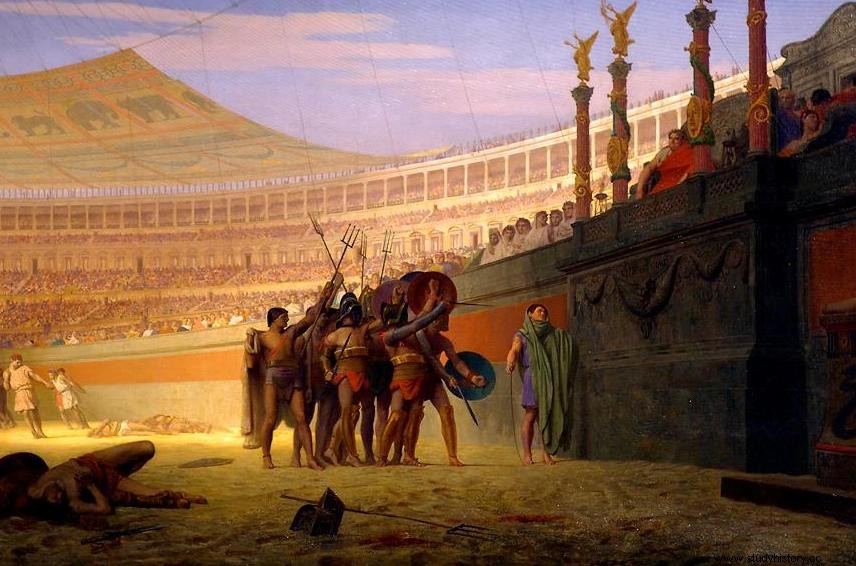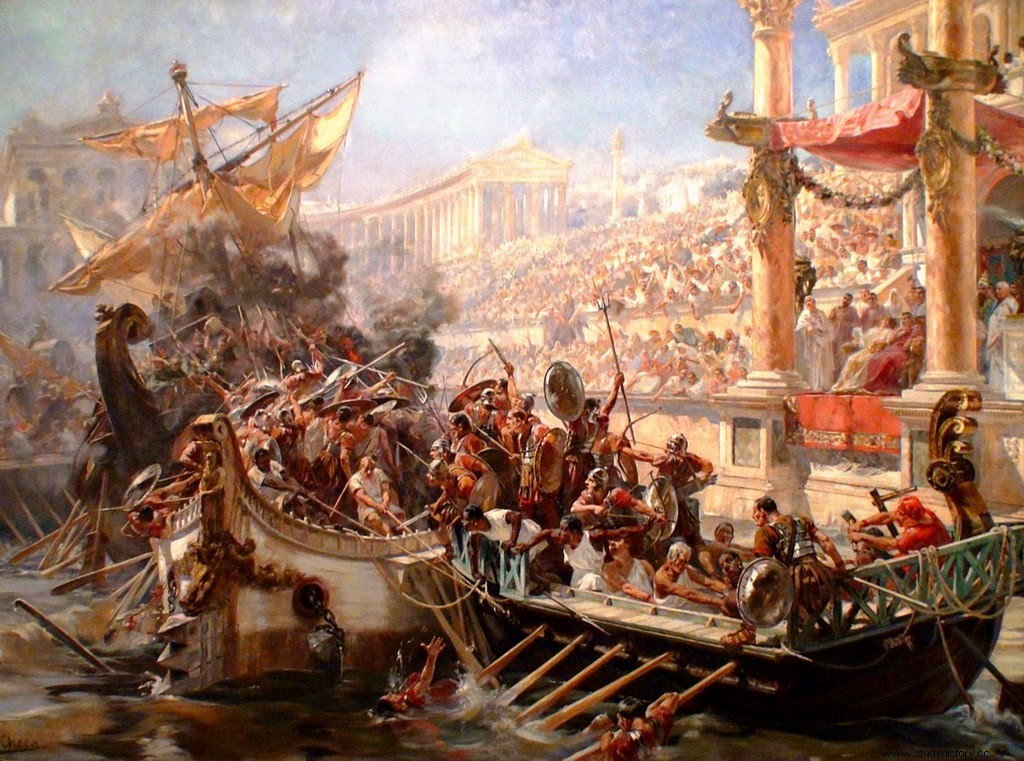Some time ago I was talking about an error in the interpretation of a painting from the 19th century (that of the thumbs up and down to indicate life or death of the gladiators), because today we are going to repeat the protagonists in this story:the gladiators, a painting of the 19th century… and Jean-Léon Gérôme, the author of both paintings. The painting in question by the great French painter is “Ave Caesar, morituri te salutant” (1859). The painting depicts a typical scene in an amphitheater where the gladiators address the Emperor shouting "Hail Caesar, those who are about to die salute you" before starting their corresponding combats.

Ave Caesar, morituri te salutant
I suppose that, as on the previous occasion, the painting has also influenced literature, cinema and popular memory to believe that «Ave Caesar, morituri te salutant » was a ritual greeting of the gladiators before the Emperor. Well, I'm sorry to say that the gladiators never pronounced it… the naumachiarii did. (participants in the naumachias ).
And what are naumaquias?
The naumachias (from Latin naumachia , "naval battle") would be like a cross between the movie Battleship and the board game “Sink the fleet ” but without special effects, in real time and at natural size. In 46 BC, and after being appointed dictator of Rome, Julius Caesar decided to entertain the people with a show never seen before, the first naumachia. Caesar's idea was to be able to recreate naval battles, and for this he ordered a huge circular moat to be dug in the Field of Mars that communicated with the Tiber River through a canal. Once finished, the dam was opened and the waters of the Tiber flooded the moat as an artificial lake. Such was the size of that theater of naval performances that it housed biremes, triremes and even the aircraft carriers of the time, the quadriremes. Some 2,000 combatants and more than 4,000 rowers participated in this first naumaquia, the vast majority of the participants were "recruited" from among prisoners of war and sentenced to death.

Naumachia of Ulpian Czech
In the year 2, by order of Emperor Augustus, the naval battle of Salamis between Greeks and Persians was recreated. We know about this battleship from Res Gestae Divi Augusti (The works of the Divine Augustus), a kind of autobiography of the emperor…
I offered the people the spectacle of a naumaquia, on the other side of the Tiber, where today is the Sacred Forest of the Caesars, in an excavated pond 1,800 feet long and 1,200 wide [about 18 hectares]. Thirty ships, triremes or biremes, garnished with spurs, and an even greater number of smaller ships took part. On board these fleets fought, not counting the oarsmen, about 3,000 men.
It would be Nero who would inaugurate another version of these combats, those developed in an amphitheater built for that purpose. The zenith of this spectacle would come in the 80s (of the 1st century) when the emperors Titus and Domitian celebrated naumachias in the Colosseum (originally called Amphitheatrum Flavium because its construction involved the emperors of the Flavian dynasty). Due to the size of the venue, in these representations there were fewer actors and the ships could hardly turn. So, viewers had to settle for boarding and hand-to-hand fighting. Due to the difficulties of flooding the Colosseum and the high cost of building artificial lakes or adequate amphitheaters, the naumaquias were falling into oblivion.
And these naumachiarii they were the ones who pronounced the ritual phrase that, erroneously, we have attributed to the gladiators who fought in the arena...
Morituri te salutant
The historian Suetonius he was the first, and only, who made reference to it in his work Lives of the Twelve Caesars , when the naumachiarii they addressed Emperor Claudius in the naval battle he organized during 52 at Lake Fucino. It is not surprising that they pronounced this death sentence, since combatants and oarsmen were prisoners of war sentenced to death. His destiny was to drown or die killing . So, I'm sorry to say that there is no reference to the time when gladiators pronounced it. In fact, far fewer gladiators died than we thought… they were too precious a commodity.
